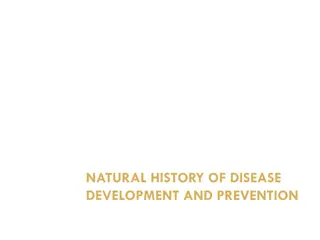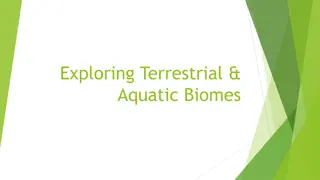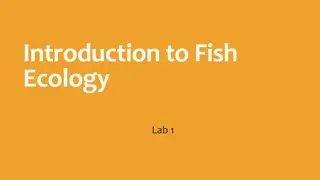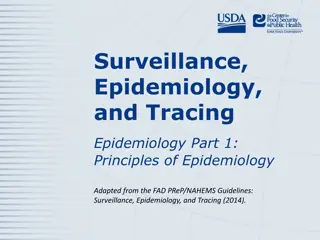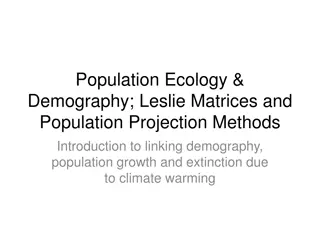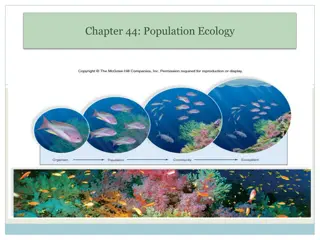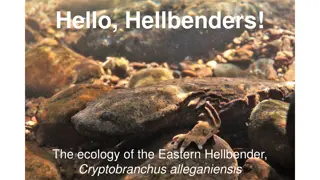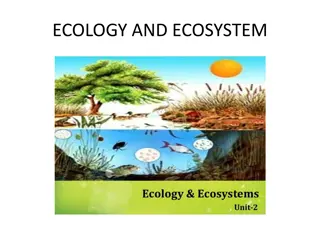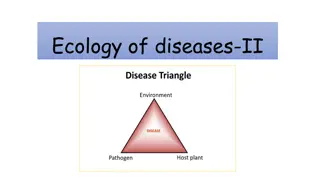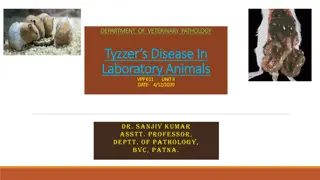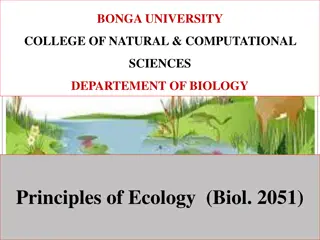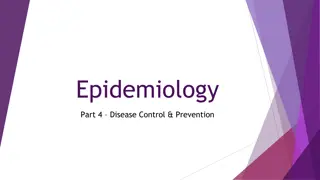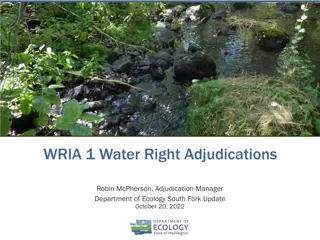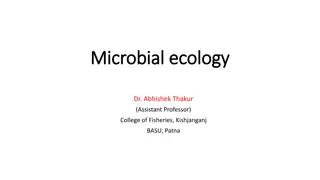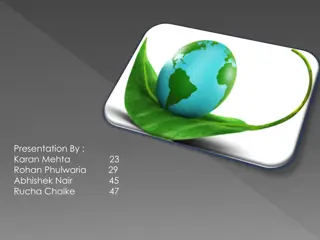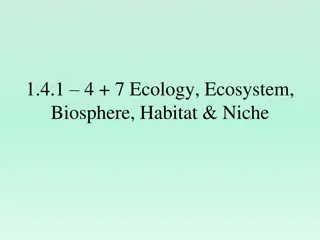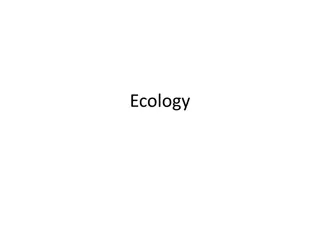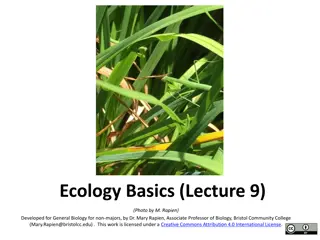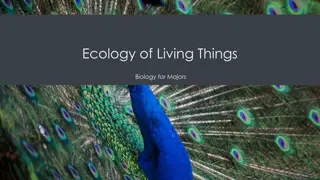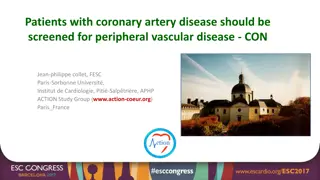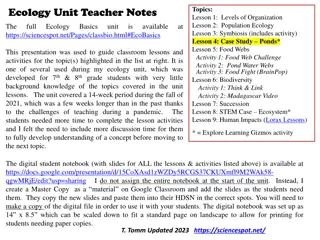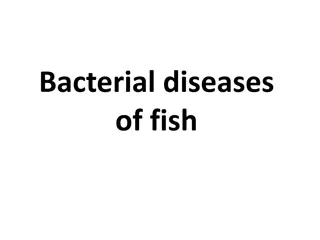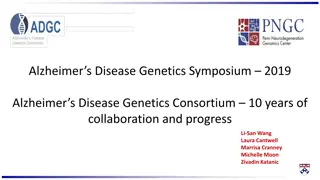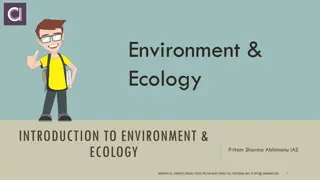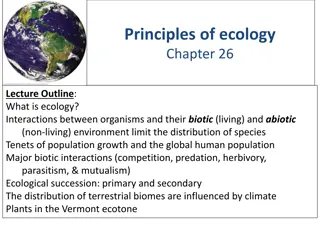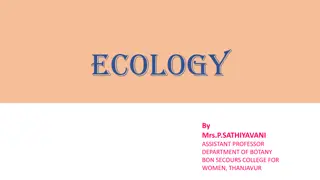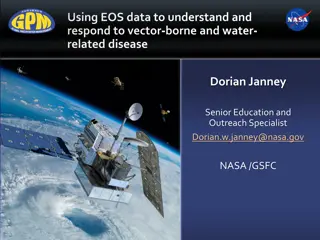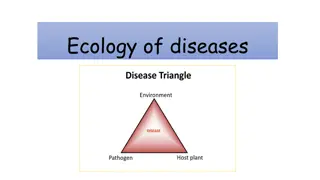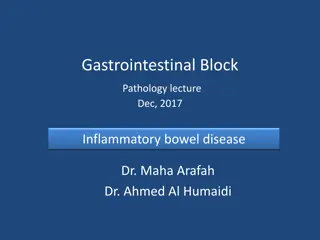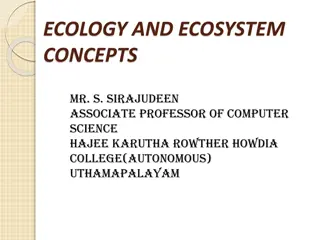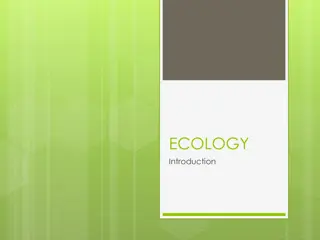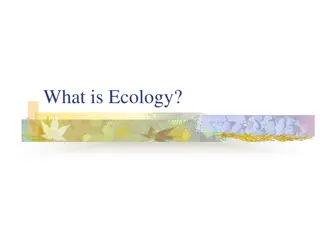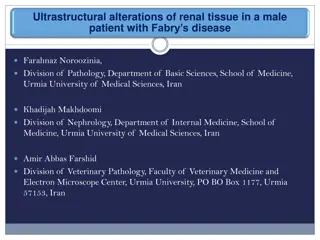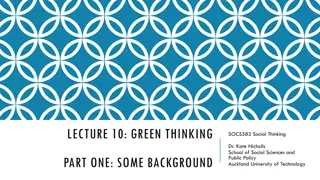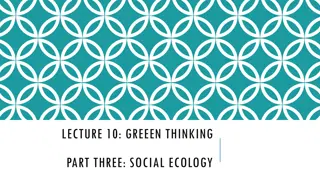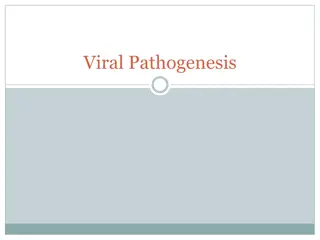Understanding Ecology: Interactions Between Organisms and their Environment
Ecology is the scientific study of how living organisms interact with each other and their environment. It delves into the relationships between biotic and abiotic factors, encompassing topics such as the distribution and abundance of organisms, structural adaptations, behavior under natural conditi
2 views • 42 slides
Understanding the Natural History of Disease Development and Prevention
The natural history of disease development outlines the progression of a disease in an individual without intervention, from exposure to outcome. Learning objectives include defining prevention terms, understanding disease severity, prevention levels, and intervention measures. Studying disease prog
4 views • 16 slides
Understanding Ecosystems: Ecological Interactions and Dependencies
Ecology is the study of how organisms interact with their environment, influencing their distribution and abundance. This exploration covers terrestrial and aquatic biomes, energy flow, environmental impacts, adaptations, and global ecosystems, emphasizing the interconnectedness of all living organi
2 views • 58 slides
Understanding Fish Ecology: Interactions, Diversity, and Environmental Factors
Fish ecology involves studying the distribution, interactions, and abundance of fish species in different ecosystems. This lab delves into the divisions of ecology, fish species diversity in marine and freshwater ecosystems, and the environmental factors affecting fish diversity and abundance. Disco
1 views • 7 slides
Principles of Epidemiology: Understanding Disease Occurrence and Surveillance
Epidemiology is the study of disease patterns, factors influencing disease occurrence, and the core functions of surveillance, field investigation, and analytic studies. It involves understanding disease characteristics, natural history, and evaluating the effectiveness of activities to mitigate dis
1 views • 25 slides
Understanding Population Ecology and Demography Through Leslie Matrices
Explore the critical aspects of population ecology and demography, focusing on factors influencing abundance, population growth, regulation, and the impacts of climate change. Learn about population projections, growth models, age-structured populations, and data requirements for estimating populati
4 views • 35 slides
Understanding Population Ecology and Growth Patterns
Explore the intricacies of population ecology, demography, distribution patterns, and growth rates in natural populations. Learn about limiting factors, resources, biotic potential, and the concept of carrying capacity. Gain insights into population dynamics and the interplay between organisms and t
1 views • 19 slides
Understanding the Ecology of Eastern Hellbenders
This comprehensive guide explores the ecology of Eastern Hellbenders (Cryptobranchus alleganiensis), discussing the abiotic and biotic factors influencing these fascinating salamanders. Covering topics such as populations, communities, and the essential role of producers, it sheds light on the chall
2 views • 16 slides
Understanding Ecology and Ecosystem: A Comprehensive Overview
Ecology, derived from the Greek word "oikologie," explores the interactions between organisms and their environment. The study encompasses various branches like human ecology, population ecology, and habitat ecology, focusing on the relationships within ecosystems. An ecosystem, defined by A.G. Tans
1 views • 68 slides
Understanding Ecosystems and Disease Ecology
Explore the diverse types of ecosystems, including autochthonous, anthropurgic, and synanthropic ecosystems, and their impact on disease ecology. Learn about biotopes, biocenosis, ecological mosaics, and ecological interfaces, and discover how infectious diseases can be transmitted across these inte
0 views • 10 slides
Insights into Tyzzer's Disease: An Overview of a Bacterial Infection in Laboratory Animals
Tyzzer's disease is an acute bacterial infection affecting rodents and rabbits, caused by Clostridium piliforme. Discovered in 1917 by Ernest Tyzzer, the disease is characterized by necrotic lesions in the caecal mucosa, liver, and heart. Initially known as Bacillus piliformis, it was later renamed
2 views • 21 slides
Understanding Media Ecology: Impact of Communication Technology
Media ecology is a theoretical concept analyzing the influence of media and communication technology on human culture. Neil Postman, a prominent figure in the field, delves into how communication media affect human perception, understanding, and values. This study views media as environments shaping
5 views • 23 slides
Principles of Ecology: Understanding Organism-Environment Interactions
Ecology is the scientific study of how living organisms interact with each other and their environment. It involves understanding organisms at their native habitats, from individuals to ecosystems. The discipline encompasses various branches and focuses on the relationships shaping the distribution
1 views • 14 slides
Understanding Disease Control and Prevention in Epidemiology
This article discusses disease control processes in epidemiology, including reducing disease incidence, duration, and transmission. It covers public policy interventions, elimination, eradication, and extinction of infectious agents. It also highlights preventable causes of disease and different lev
2 views • 10 slides
Understanding Water Right Adjudications in Washington State
Water right adjudications in Washington State, managed by Robin McPherson of the Department of Ecology, aim to regulate water ownership through legal processes. The adjudication recognizes various water users' rights, including federal and tribal, and involves a thorough review of claims by Ecology
1 views • 12 slides
Understanding Microbial Ecology: Interactions and Associations in Ecosystems
Interactions of organisms in ecosystems play a crucial role in the functioning of microbial ecology. Dr. Abhishek Thakur explores symbiosis, mutualism, syntrophism, commensalism, predation, and parasitism, shedding light on how different organisms interact with each other and their physical environm
0 views • 9 slides
Understanding the Relationship Between Ecology and Business
Ecology and business have a complex relationship where human activities impact the ecological environment, and in turn, the environment influences our quality of life. Maintaining ecological balance is crucial for sustainable development, and businesses play a significant role in ensuring environmen
0 views • 19 slides
Understanding Ecology and Ecosystems
Discover the definitions and concepts of ecology, ecosystems, biosphere, habitats, and niches. Learn how living organisms interact with each other and their environment, explore different types of ecosystems, and understand the global ecosystem known as the biosphere.
0 views • 20 slides
Understanding Ecology and Basic Concepts in Environmental Science
Explore the fundamental concepts of ecology and environmental science, including species, habitat, population, community, autotrophs, heterotrophs, environment components, food chains, and trophic levels. Learn about the intricate relationships between living organisms and their surroundings in this
0 views • 35 slides
Understanding Ecology: Ecosystems, Biodiversity, and Energy Flow
Explore the intricate world of ecology through topics such as ecosystems, biodiversity, energy flow, and nutrient cycling. Delve into the concept of niches, biodiversity levels, and the importance of energy flow and materials cycling in sustaining ecosystems. Learn about the nitrogen and carbon cycl
1 views • 18 slides
Understanding Ecology: Interactions and Environments in Biology
Ecology is the study of interactions between living organisms and their environment. It involves levels of research such as animal ecology, plant ecology, and more, while also exploring the biosphere's impact, biogeography, species distribution patterns, and energy sources like sunlight. Ocean upwel
1 views • 80 slides
Screening for Peripheral Vascular Disease in Patients with Coronary Artery Disease
Patients with coronary artery disease should be screened for peripheral vascular disease as it is a frequent integrator of global cardiovascular risk. The association of atherosclerosis in various arterial diseases highlights the importance of identifying multisite artery disease. The prevalence and
0 views • 23 slides
Human Disease Symptom Network: Understanding Disease Relationships Through Symptoms and Genes
The Human Disease Symptom Network (HSDN) is constructed using a large-scale medical bibliographic records database to form a network of human diseases based on symptom similarities. By integrating disease-gene associations and protein-protein interaction data, correlations between symptom similarity
0 views • 37 slides
Comprehensive Ecology Unit for Middle School Students
Engage 7th & 8th grade students in a 14-week ecology unit covering topics like levels of organization, population ecology, symbiosis, biodiversity, human impacts, and more. Utilize digital notebooks, interactive activities, and exploration tools to enhance learning and understanding. Access resource
0 views • 18 slides
Understanding Bacterial Diseases of Fish: Columnaris Disease Overview
Columnaris disease, also known as Saddleback disease, is a common bacterial infection in fish that is often brought about by poor handling and high stress levels. This disease manifests as tail and fin rot, leading to rapid fish mortality. The causative organism, Cytophaga (formerly Flexibacter), is
0 views • 21 slides
Decoding Genetics: Insights from Alzheimer's Disease Symposium to Type 2 Diabetes Study
Explore the latest findings from the Alzheimer's Disease Genetics Symposium 2019 on disease mechanisms, drug targets, and genetic pathways. Dive into the progress made by the Alzheimer's Disease Genetics Consortium over the past decade. Transition to a Genome-Wide Association Study uncovering suscep
0 views • 42 slides
Introduction to Ecology and Environment Studies
Ecology is the study of the relationship between organisms and their environment, while the environment refers to the surroundings that influence living organisms. The biosphere is divided into the atmosphere, lithosphere, and hydrosphere. Terms in ecology include species, populations, communities,
0 views • 13 slides
Exploring Ecology: Interactions, Distribution, and Population Dynamics
Ecology delves into the relationships between organisms and their environment, understanding factors that limit species distribution, major interactions like competition and predation, as well as population growth patterns. This includes the influence of biotic and abiotic factors, ecological succes
0 views • 30 slides
Understanding Ecology: Key Concepts and Types Explained
Ecology, a vital branch of science, delves into the relationships between organisms and their environment. It encompasses biotic and abiotic factors, studying how living and non-living elements interact within ecosystems. Biotic components include living organisms like plants and animals, while abio
0 views • 7 slides
Liver Disease Burden in Tower Hamlets
Dr. Somen Banerjee, Director of Public Health in London Borough Tower Hamlets, highlights the concerning liver disease mortality rates in the area, with high incidence of cirrhosis, cancer, and hepatitis B and C. The data reveals a significant burden of liver diseases such as Non-Alcoholic Fatty Liv
0 views • 18 slides
Leveraging NASA EOS Data for Water-Related Disease Research and Response
Explore how NASA EOS data is crucial in understanding and addressing vector-borne and water-related diseases, such as malaria outbreaks. Through satellite observations, a deeper insight is gained into natural hazards' impact on public health and ecology, aiding in disaster preparedness and disease t
0 views • 6 slides
Understanding Ecology of Diseases: An Overview
Ecology plays a crucial role in the study of disease patterns and transmission. By understanding the ecological factors influencing disease spread, researchers can predict outbreaks and develop effective control strategies. Concepts like animal populations, food availability, and competition shape t
0 views • 11 slides
Understanding Inflammatory Bowel Disease: Crohn's Disease and Ulcerative Colitis
Inflammatory Bowel Disease (IBD) encompasses Crohn's disease (CD) and ulcerative colitis (UC), chronic conditions with immunologic basis. This article delves into the epidemiology, pathophysiology, and differences between CD and UC, highlighting clinical features, pathology, and complications like a
0 views • 42 slides
Ecology and Ecosystem Concepts: Understanding Interrelationships in Nature
Ecology explores the interconnections between living organisms and their environment, dating back to zoologist Geoffroy St. Hilaire's early proposal in 1859. The term "ecology" originates from the Greek words for house and discourse, emphasizing the study of organisms within their habitat. Ecosystem
0 views • 36 slides
Exploring Ecology: Interactions and Environments
Dive into the world of ecology, where organisms interact and rely on each other and their surroundings. Understand the concepts of populations, communities, ecosystems, biomes, and the biosphere. Explore the vocabulary of ecology, from individual organisms to entire biomes. Learn about food chains,
0 views • 14 slides
Understanding Ecology: Interactions in the Environment
Ecology, originating from the Greek words "Oikos" and "Logos," is the study of interactions between living and non-living components in the environment. It encompasses the relationships between plants, animals, microorganisms, and abiotic factors like light, water, nutrients, and atmosphere. Studyin
0 views • 16 slides
Ultrastructural Alterations of Renal Tissue in a Male Patient with Fabry's Disease
Fabry's disease is a rare X-linked lipid storage disorder characterized by deficient lysosomal alpha-galactosidase A activity. This condition primarily affects males, leading to chronic kidney disease and progression to end-stage renal disease. Kidney involvement is a critical aspect, and high doses
0 views • 24 slides
Exploring Green Thinking: Societal Perspectives on Environment and Ecology
Delve into the realm of green thinking through the eyes of social sciences in this lecture by Dr. Kate Nicholls at Auckland University of Technology. The discourse ranges from traditional Western views on nature to the rise of the green movement, including discussions on deep ecology, social ecology
0 views • 9 slides
Exploring Social Ecology and Anarchism: A Path to Sustainable Future
Social ecology emphasizes the interconnectedness between social issues and environmental problems, advocating for a society without domination or centralized control. Anarchism, often associated with social ecology, critiques hierarchy and promotes cooperation. The affinity between feminism and ecol
0 views • 8 slides
Understanding Viral Pathogenesis: Causes and Consequences
Viral pathogenesis involves the process by which a virus leads to disease, exploring the interplay between viral and host factors. It encompasses the concepts of virulence, viral disease, and the effects on infected cells and the host's immune response. Changes within infected cells, including cell
0 views • 26 slides

